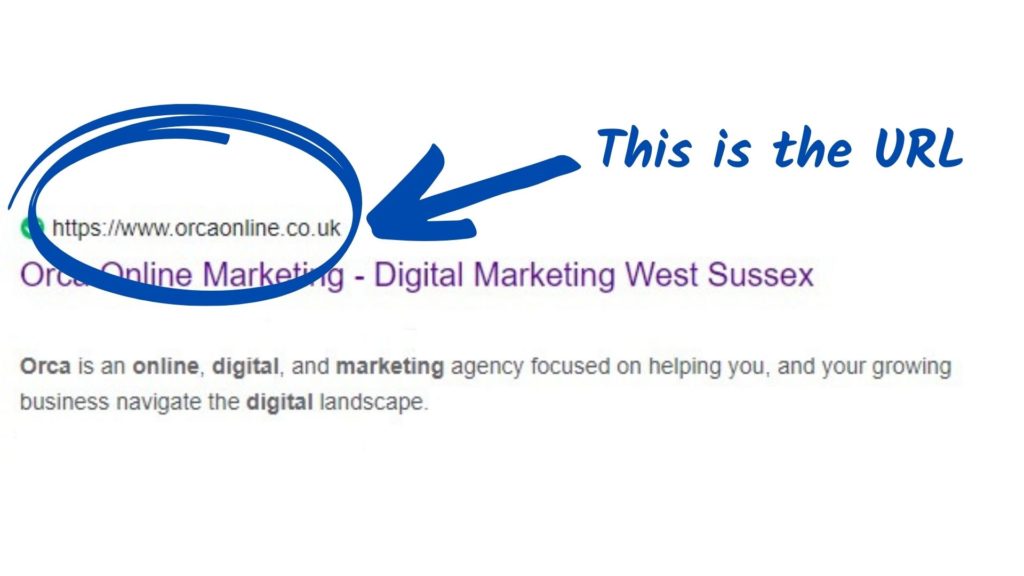There are many, many different factors that could affect the performance of any one webpage.
That’s the beauty of Search Engine Optimisation work: because of the variety of potential issues, it’s certainly never boring.
Now, on the face of it, URL length may not sound the most fascinating of SEO considerations.
But in this post, I want to examine how important a role they could play in the Google ranking of your website.
OK, let’s start at the beginning: what are URLs?
The acronym stands for Uniform Resource Locator.
Whenever you search for something online, you are presented with an array of potential websites.
The URL is the web address which features at the top of the listing.

As you can see, Orca’s homepage URL is nice and succinct.
And to be honest, you would expect that for most homepage URLs as these are most likely to be the site’s domain name.
They want to be short and memorable to help people find them.
But what about web pages that appear elsewhere on a site?
Large e-commerce websites for example, can have hundreds – if not thousands – of pages, and this can sometimes lead to some rather lengthy URLs.
But does this matter?
Ultimately, the argument of whether the length of a URL really matters comes down to a balance between Search Engine Optimisation (SEO) and User Experience (UX).
Recently John Mueller – who is a big wig at Google – was asked whether the length of a URL has any impact on its position in Search Engine Result Pages (SERPs), and this is what he said:
“The direct answer is no. The URL length doesn’t matter. We use URLs as identifiers, it doesn’t matter how long they are. Personally, I try to keep them shorter than 1,000 characters, but that’s just to make monitoring easier. The number of slashes in there also doesn’t matter.”
This is pretty conclusive evidence that – from an SEO perspective – you shouldn’t have to worry too much about how long that URL is.
But what about UX?
There is less quantifiable evidence out there to prove that a shorter URL is preferable for humans surfing the web.
As browsers and potential consumers, we are more likely to trust a succinct and descriptive URL than a long, non-sensical one.
For example, if you were searching for tips on dog grooming, you’d arguably be more likely to click on a URL like:
https://www.example.com/blog/top-dog-grooming-tips
Than you would:
https://www.example.com/blog/the-best-way-to-groom-your-dog/pet-advice/hjkl/1234/!?@
For UX, it’s a case of inspiring confidence in the validity and reliability of the link: is it spam or a genuine source of useful content?
This would be particularly true if these links were published on a company’s social media accounts.
The fact that URL shorteners like Bitly exist should also be a clue that humans prefer shorter links to long ones.
If we agree then that – if for no other reason - URL lengths should be kept to a ‘reasonable’ length to help with UX, what sort of best practices should we aim to achieve?
Stop Words are the most common words that search engines typically avoid. A few examples could include: ‘A’, ‘For, ‘To’.
While these may be necessary to form a coherent sentence, they can be the first words eliminated from a URL to keep the character length down.
In a recent Q&A (September 2022), John Mueller was asked whether stop words should be removed for SEO purposes.
Here's what he said:
"Words in URLs only play a tiny role for Google Search. I would recommend not overthinking it.
"Use the URLs that can last over time, avoid changing them too often and try to make them useful for users.
"Whether you include stop words in them or not, decide to use numeric IDs, that’s totally up to you.”
Hopefully you will have identified useful keywords for your web content, and these should – where possible – feature in your URL.
This will help with search engine rankings.
As with stop words, limit any unnecessary characters like “ < > + =
They can put people off (UX) and even confuse search engines (SEO).
When separating your words, use either a hyphen (-) or underscore (_) but DON’T leave a space as this could result in a %20 appearing which could really detract from the URL’s readability.
Use Hyphens
There is sometimes some debate as to how best to separate words in URLs.
According to John Mueller (there's that name again), hyphens are the preferred option for search engines.
“Consider using hyphens to separate words in your URLs, as it helps users and search engines identify concepts in the URL more easily. We recommend that you use hyphens (-) instead of underscores (_) in your URLs.”
To conclude then, when it comes to Search Engine Optimisation, URLs can - in theory - be any length. You won’t get penalised when it comes to search engine rankings.
But to make your content more appealing to site visitors, it’s best to keep them as short as possible.
Need help with your site’s SEO?
Get in touch with Orca today.
Content updated 21 September 2022